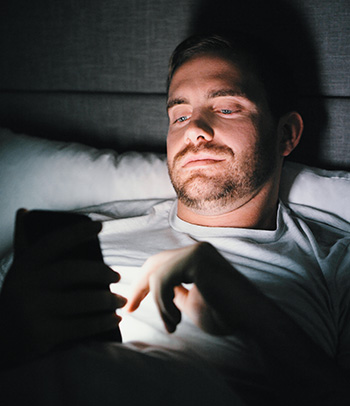Technology is a part of our daily lives, often from the time we wake up until the time we fall asleep. Many people rely on technology for several hours a day while working, and many of us scroll, text, game or binge-watch our way through the weekend.
But what is all this screen time doing to our health and wellness? According to data from the National Library of Medicine, studies show too much screen time can have a negative effect on our health. Learn more about how screen time can affect your health and what you can do about it.
The Impact of Screen Time on Our Health
 Too much screen time has been linked to various mental and physical health issues. Studies like this one from MedlinePlus often focus on the negative effects it can have on children and their development, but there are health concerns for adults as well:
Too much screen time has been linked to various mental and physical health issues. Studies like this one from MedlinePlus often focus on the negative effects it can have on children and their development, but there are health concerns for adults as well:
- Eye strain — Staring at a screen for a long time can strain your eyes. Digital eye strain can lead to vision problems, such as an increase in nearsightedness, can cause headaches and can leave your eyes dry and uncomfortable.
- Posture issues — If you’re hunched over a screen for long periods of time or slouching in a chair playing video games, it can cause stiffness and pain in your neck and back, and can lead to worsened posture overall.
- Hand and wrist trouble — When you type or text a lot or use video game controllers for long periods of time, your hands, fingers and wrists can suffer. You can get muscle and joint stiffness and pain, sometimes requiring medical intervention.
- Sleep problems — Too much screen time, especially before bed, can cause insomnia and trouble falling asleep. The blue light emitted from your screen interferes with your brain’s ability to make melatonin, which you need to help you become drowsy and fall asleep.
- Increased risk for obesity and related health problems — Too much sitting and not enough movement have been linked to higher rates of depression, type 2 diabetes, high blood pressure, poor nutrition habits and more. If many hours a day are spent in front of a screen, it leaves us less time to do healthy activities such as walking or exercising.
- Increased withdrawal and isolation — if you’re spending hours online gaming or scrolling through social media posts, chances are you’re not interacting as often with people face to face. It may become harder to interact with people if you’re used to screens between you.
- Lower self-esteem — This has shown up in studies most often related to the time spent on social media. If you’re constantly looking at smiling, happy pictures of other people, it may impact the feelings you have about your own life.
It’s important to remember that not all screen time is equal when it comes to its impact on your health. For example, a video call with a loved one is not going to have the same effect as an hour spent on social media. A small amount of time playing an interactive video game with a group of friends is not the same as gaming in your basement alone for several hours at a time.
Tips to Reduce Your Screen Time
Small changes, like taking breaks and setting limits, can go a long way in establishing healthy screen time habits.
Technology and our use of it isn’t going anywhere. We need screens to work and communicate, and many of us use them to relax. But we can consider these tips to ensure we’re managing the time we spend on screens in a responsible and healthy way:
- Set limits. Take a day or two to see how often you’re in front of a screen. If it feels like it’s too much time, consider setting limits. For example, you could set a timer that allows you 30 minutes on social media. You could give yourself an hour to play on your phone after your workday ends. You could limit yourself to gaming only on the weekends. It’s up to you to find something that works for your lifestyle.
- Tell others around you. Letting others in on what you’re doing can help you stay accountable, especially if you do it together. For example, you and your partner can both agree to stay off your phones in bed. You and your friends can come up with another activity once a week that doesn’t involve gaming. These strategies can benefit your entire family, especially young children. By limiting your screen use, you’re modeling good behavior for them. If you’re wondering about the effects of screen time on young people and need some tips to reduce it, check out the Centers for Disease Control and Prevention’s Screen Time vs. Lean Time.
 Make it easier on yourself. Much of our screen time is done without even thinking. We just pick up our phone because it’s right there next to us. Try putting your phone a few feet away at night, place it on silent during dinner and turn off unnecessary notifications so you’re not drawn in when you don’t need to be.
Make it easier on yourself. Much of our screen time is done without even thinking. We just pick up our phone because it’s right there next to us. Try putting your phone a few feet away at night, place it on silent during dinner and turn off unnecessary notifications so you’re not drawn in when you don’t need to be.- Lower your screen’s brightness. If you plan to use your phone at night or in the evening, lower your screen’s brightness or invest in a pair of glasses that help to block the blue light. This can help reduce the impact your screen time has on your sleeping patterns.
- Stop screens at least 30-60 minutes before bed. Since we know screens impact our ability to fall asleep, try to establish a bedtime routine that doesn’t involve scrolling until you fall asleep. Try reading a book, doing a meditation exercise or something else you find relaxing instead.
- Take eye breaks. To reduce eye strain, make it a point to look up and look around (experts suggest every 20 minutes) when you’re involved in screen time. Be sure to blink and look at objects in the distance to readjust your eyes and keep them moisturized.
- Make time for movement breaks. Don’t let the hours slip away without some kind of movement for your body. Stretch, get up and walk around in between your work on a computer or your quest to beat your newest video game. In addition, give your hands and fingers a break. You might need to do stretches for your hands and fingers or ice them. This is important for gamers or people who type all day long.
For more tips on reducing your screen time or on how to complete a digital detox, check out Is It Time for a Digital Detox?
Resources
- The CDC has some great ideas for kids and parents on how to reduce screen time and get more “lean time.”
- The We Can! Initiative also offers ideas on how to reduce screen time for families, including resources to track your screen time.
- The Department of Veterans Affairs (VA) offers Whole Health, a program that includes setting goals and coaching to better your health and wellness. These resources could help you make reducing your screen time a reality.
Technology is here to stay, but we can reduce its effects on our health. Small changes, like taking breaks and setting limits, can go a long way in establishing healthy screen time habits.







